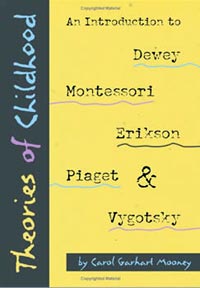
Buy it from Amazon
FYI, these are sometimes referral links!
| Subtitle | An Introduction to Dewey, Montessori, Erikson, Piaget & Vygotsky |
| First Written | 2000 |
| Genre | Education |
| Origin | US |
| Publisher | Redleaf Press |
| ISBN-10 | 188483485X |
| ISBN-13 | 978-1884834851 |
| My Copy | library paperback |
| First Read | June 02, 2010 |
Theories of Childhood
Commence book report section! I'm compiling my notes here, so don't expect any cleverness. And seriously, if anybody ever reads this and can correct me, please do.
John Dewey, 1859-1952. Mostly redefined education as something that is individualized and process-based, rather than a rote drill. But Dewey would not prize process over results - there's no room in his theories for painting green birds in science class when you're supposed to be learning about cardinals.
Maria Montessori, 1870-1952. First woman in Italy to graduate medical school. Original school was 'Casa de Bambini', in inner-city Rome. She found that she could teach the 'hopeless' cases using her methods, and then expanded to all children.
Basic idea: allow children to do real work, rather than make-believe. Give them real tools scaled down to fit their bodies. While it's often easier to do something for a child than to teach them to do it by themselves, the latter is how kids really learn. And it's how they want to learn, too. Montessori is based on real work, long blocks of open-ended time for children to choose their own activities, and a carefully prepared environment full of useful tools.
Erik Erikson, 1902-1994. Studied child psychoanalysis. Posited stages of psychosocial development, largely replaced by Piaget.
Jean Piaget, 1896-1980. Posited that learning is neither intrinsic nor extrinsic, but formed by a combination of the two. He's famous for his stages of cognitive development.
- 0-18 months: Sensorimotor. Basically aligning your senses with the world.
-18mo-6years: Preoperational. Ideas and learning is based on direct experience.
- 6-12 years: Concrete Operational. etc.
- 12y-death: Formal Operational. abstract thinking.
Lev Vygotsky, 1896-1934. Finally, some controversy! Vygotsky's big idea is the ZPD, or Zone of Proximal Development. Rather than pin children down to an average schedule, you should look for the ZPD - the gap between what they can do by themselves and what they can do with assistance. Help them conquer an activity by themselves, and that's real education. Because Piaget's theories are pinned to a certain age, kids don't get pushed; the ZPD provides a framework to keep all kids advancing individually.
Noted on June 10, 2010
This book is a primer to five figures that were influential in developmental psychology - or maybe childhood development. I'm so new to this field I don't even know what to call it. I grabbed this from the library because I'm looking for a good introduction to the Montessori idea, and this threw in a few other concepts for free.
Mooney's book is very targeted towards educators, so half the book is full of classroom examples, which I mostly skipped by. It's an uncritical overview of these five influential people, without any context.
Noted on June 10, 2010